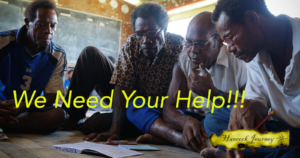Bible Translation: Building For Sucess
 Occupying the eastern half of the island of New Guinea in the South Pacific, Papua New Guinea (PNG)is home to approximately 12 percent of the world’s total languages. There are currently 841 living languages in Papua New Guinea, which comprises an area slightly larger than California. Only about one-fifth of the nation’s population of 6.9 million lives in urban areas. Building success for Bible Translation is ongoing for PNG.
Occupying the eastern half of the island of New Guinea in the South Pacific, Papua New Guinea (PNG)is home to approximately 12 percent of the world’s total languages. There are currently 841 living languages in Papua New Guinea, which comprises an area slightly larger than California. Only about one-fifth of the nation’s population of 6.9 million lives in urban areas. Building success for Bible Translation is ongoing for PNG.
“We’ve worked so hard in this country for so many years,” said Bruce Smith, President and CEO of Wycliffe Associates. “But it’s a land with extremely difficult geography. People are living in incredibly remote areas. It can take days to reach some of them.”
For more than 50 years, Wycliffe Associates has been building Bible translation centers around the world, which provide technology and space for mother-tongue translators to safely undergo training in Bible translation methods and work collaboratively to translate the Scriptures for their own language groups.
“Until now, Bible translators in Papua New Guinea have lived and worked in very remote locations,” said Smith. “Progress has been steady, but it’s been slow.”
More than 200 language groups in Papua New Guinea are without a single word of the Bible in their language. Wycliffe Associates wants to change that with a national Bible translation training center and plans to launch 20 new language projects immediately—followed by 200 more language projects.
Many Papua New Guineans engage in ancestor worship and demonic rituals, and live in fear of black magic.
One longtime church leader in Papua New Guinea said, “We are tired of watching our people walk into eternity without knowing the Word of God.”
Wycliffe Associates is currently raising $75,000 for the training center building, as well funds for launching 20 Bible translation projects at a cost of $19,500 each.
“Now, for the first time,” Smith says, “we can network with all the national church groups in a single location, equip them to launch Bible translation projects with their own congregations, and accelerate Bible translation more dramatically than ever before.”


